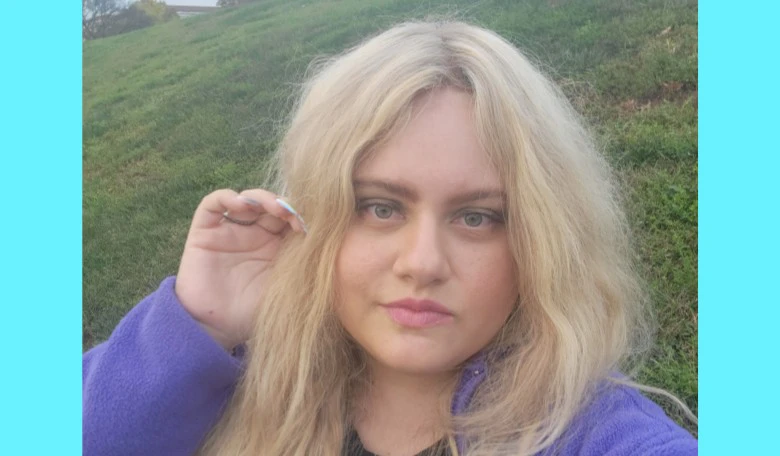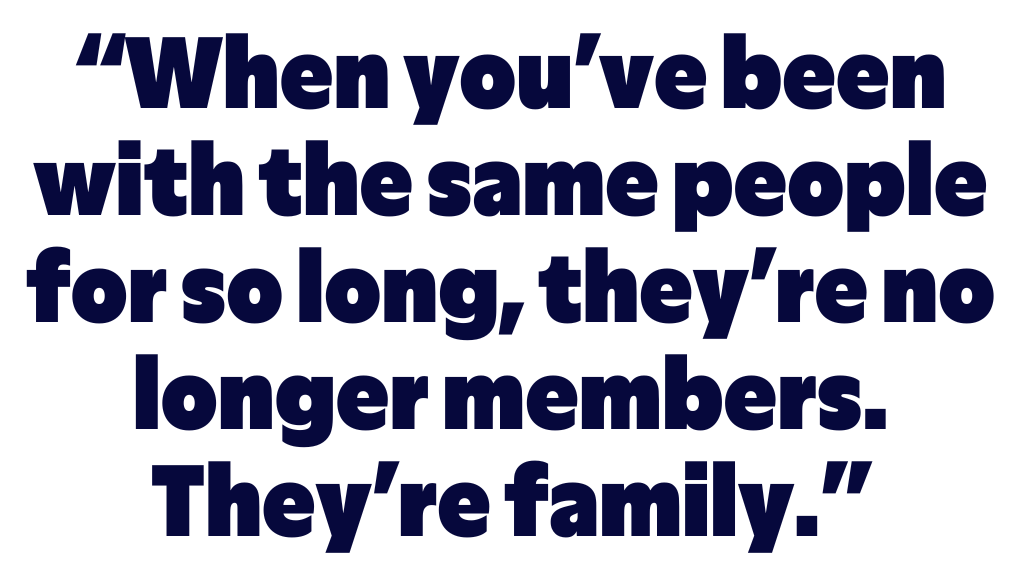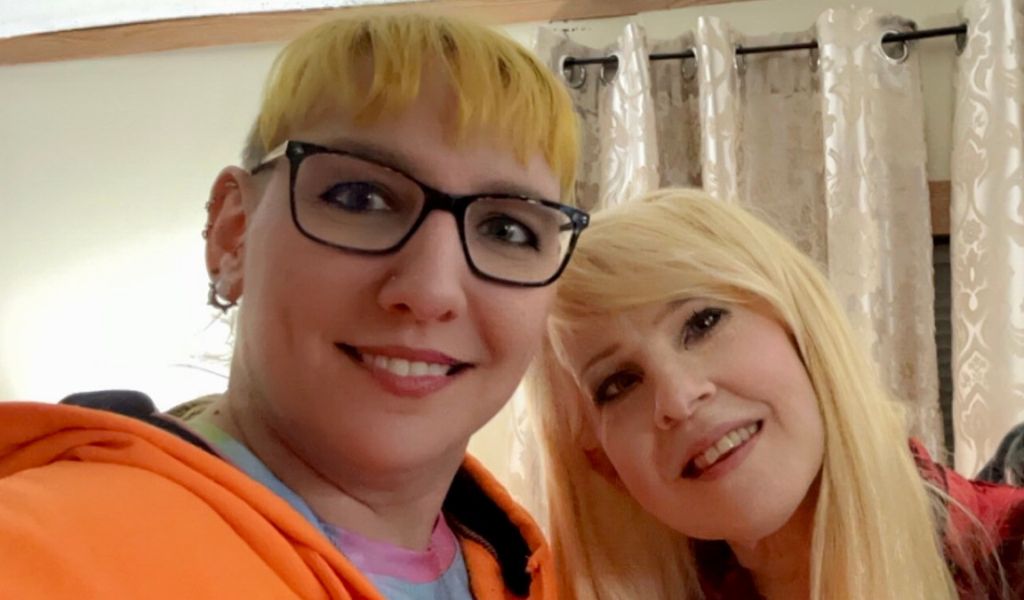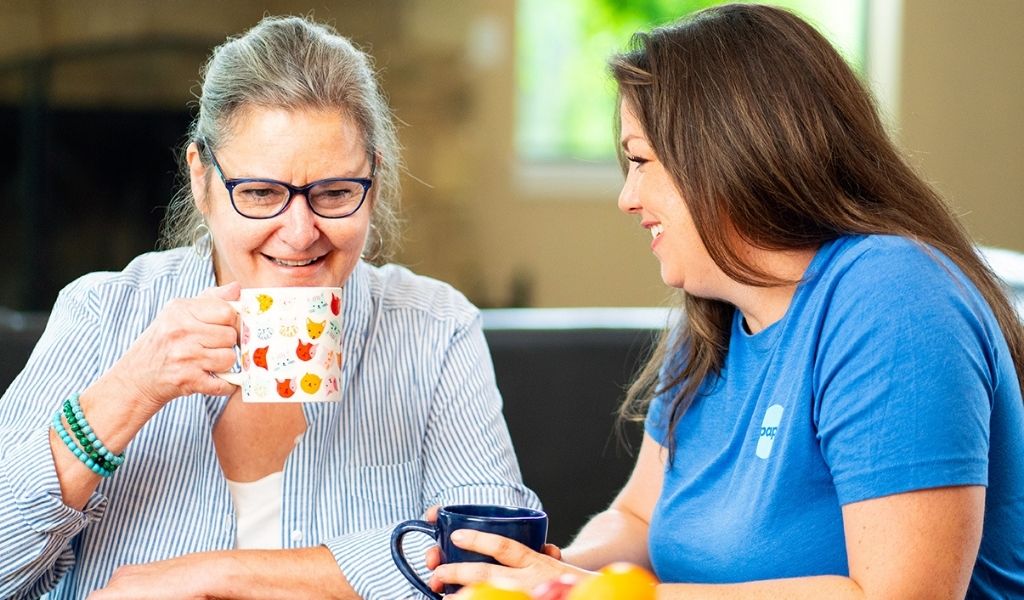
Papa Pal Stephanie has taken more than 1,500 visits since joining Papa way back in 2017. This makes her a Visit Veteran in our book, and one of our longest-tenured Papa Pals. She also works full time in a nurse residency program, which has given her a unique perspective on the Papa experience.
Stephanie is a strong believer that that social support from a Papa Pal is the perfect complement to traditional health care.
Meet Papa Pal Stephanie
Stephanie has always been passionate about giving back to her community, and that passion led her to pursue a career in health care. She started out in school to become an ultrasound technician, but ultimately switched to nursing. She completed her degree last year and now works full time in a nurse residency program and part time as a Papa Pal.
How did Stephanie find Papa? It was actually through Facebook, but as Stephanie likes to tell it, “Papa found me.” She remembers coming across the ad and thinking “‘This is too good to be true, but I’m going to apply anyway.’ And I don’t regret it for a second," she says. "It’s been amazing.”
“Papa is every nurse’s dream come true”
Stephanie enjoys nursing, but there are aspects of being a Papa Pal that she likes even more. As a nurse, she’s in the zone, focused on helping her patients. But Papa “is every nurse’s dream come true,” she says, “because you’re able to tap into your creative side.”
Stephanie loves spending time getting to know her members. And she loves the flexibility and relaxed environment Papa offers. She can help her members in ways she doesn’t get to help her patients as a busy nurse—like taking a walk, shopping for groceries, visiting a park, or going to the beach. Most of her members love simple things like nature, heart-to-heart talks, and food. “You’d be surprised how much those things help them at every level—physically, emotionally, mentally," she says.
Stephanie doesn’t think a degree in health care is necessary in order to be a good Papa Pal, but it has been helpful for her. There are times when she arrives for a visit and a member might be grouchy or upset. Instead of taking it personally, she’s able to recognize that it’s often related to their health situation. Maybe the member is on dialysis or chemo. Other times the pain is less physical and more emotional.
“Because of my nursing experience, I understand where members are coming from,” she says. “I know that everyone reacts differently to pain, and I’m able to help them navigate it and cope with whatever is going on. They appreciate it so much.”
Everyone needs that human touch
Stephanie has had the privilege of witnessing drastic changes in her members’ lives over the past few years. She has collected so many stories she could never tell them all. “I have a whole trunk full of memories,” she says.
She had one member who was so sad and depressed, Stephanie compared her to a plant in need of water and sunshine. After several visits, Stephanie said the member started opening up and blossoming again. “It was so beautiful.”
Stephanie took another member for her chemo treatments after she was diagnosed with leukemia. A few weeks ago, the member called and said, “Guess what? I just got my biopsy results and I’m cancer-free!” They cried tears of joy together, then the member thanked Stephanie because, after every treatment, they would grab a bite to eat and go to the beach for a heart-to-heart talk. “That got me through chemo,” she told Stephanie.
Stephanie once went to visit a member for the first time. They went to the beach and sat down to listen to the water. It was around 5:30 p.m. when the member revealed it was her birthday. “I have to do something for her,” Stephanie thought to herself. So she took her out for dinner.
The servers brought out a cake with a candle and sang to Stephanie’s new friend, and she started crying. “God knows how long it had been since somebody did something like that for her,” Stephanie says. “It taught me to be grateful for everything I have.” The visit was supposed to be three hours, but the member extended it to five. Stephanie says, “It was the best five hours of my life.”
You can’t overestimate the power of connection and companionship, she says. “The power of having somebody come over and just caring for you and doing little things here and there. The way it changes people, it’s so mind-blowing. Human beings need that interaction, that human touch.”
The bi-directional benefit of being a Pal
Stephanie loves making a positive impact on her members, but wants everyone to know that they’ve made a positive impact on her as well. “We say we go out there to help them,” she says, “but the reality is, they help us.”
She doesn’t just visit her members; she builds relationships with them. “Even when I’m working my nursing job and I haven’t seen them for a week or two,” she says, “I pick up the phone and ask how they’re doing."

Stephanie isn’t the only one reaching out. When she was finishing up nursing school, her members would send her encouraging texts and calls before her big exams. “They knew and they’d be rooting for me,” she says with a smile. Some members and their families even got together and threw her a surprise party when she graduated and passed her Boards. “I thought that was the most beautiful thing.”
She says that a lot of people take for granted what it is to have a family. “Some people don’t have that luxury. They come home and they’re literally alone 24/7. But when you have somebody who really cares for you and is there for you, it changes you and brightens your day.”
Stephanie consistently brightens her members’ days—and their lives—and they brighten hers right back.
Why Stephanie wants to be a Papa Pal for life
When people ask Stephanie what it’s like to work for Papa, she uses the old saying: “When you do what you love, you will never work a day in your life.” She loves the flexibility of her Papa schedule, and she’s passionate about her members, who have become like family to her. Not to mention the visits are so much fun.
Of her work as a nurse, Stephanie says she often feels like she’s an octopus with eight arms, making sure her patients are safe and not going through any health crises. “I’m not able to be as personable with them because I have so much responsibility and so much on my plate. But as a Pal, it’s different. I can still be a nurse, but in a more creative way.”
She says that being a Pal has changed her in so many ways. “It’s taught me to have patience, to see things from a different perspective. It’s taught me gratitude, to appreciate everything and everyone that we have. And it has fulfilled me so much to be able to give back to the community and have that community give back to me when I least expect it. It’s been such a mutual, beautiful feeling.”
Her advice to newer Papa Pals is to be yourself, have fun, and be patient. Even if you’re just washing the dishes or vacuuming or taking pets for a walk, your members will appreciate you, she says. And honestly? You’re impacting more than just one person; your impact has a ripple effect across entire communities.
“Being a Pal is so much more than a job for me,” Stephanie says. “That’s why I’m going to be a Pal until I can’t anymore. Even if I’m the CEO of my own company, I’ll still be a Pal.”


